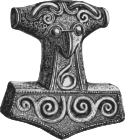- Dyggvi
-
In Norse mythology, Dyggvi or Dyggve (Old Norse "Useful, Effective"[1]) was a Swedish king of the House of Ynglings. Dyggvi died and became the husband of Hel, Loki's daughter. Dyggvi was succeeded by his son Dag the Wise.
Contents
Attestations
Snorri Sturluson wrote of Dygvvi's father Domar in his Ynglinga saga (1225):
Dyggvi hét son hans, er þar næst réð löndum, ok er frá honum ekki sagt annat, en hann varð sóttdauðr.[2]
Dygve was the name of his son, who succeeded him in ruling the land; and about him nothing is said but that he died in his bed.[3]
About Dyggvi's mother Snorri had more to say:
Móðir Dyggva var Drótt, dóttir Danps konungs, sonar Rígs, er fyrstr var konungr kallaðr á danska tungu; hans ættmenn höfðu ávalt síðan konungsnafn fyrir hit œzta tignarnafn. Dyggvi var fyrstr konungr kallaðr sinna ættmanna; en áðr váru þeir dróttnar kallaðir, en konur þeirra dróttningar, en drótt hirðsveitin. En Yngvi eða Ynguni var kallaðr hverr þeirra ættmanna alla ævi, en Ynglingar allir saman. Drótt dróttning var systir Dans konungs hins mikilláta, er Danmörk er við kend.[2]
Dygve's mother was Drott, a daughter of King Danp, the son of Rig, who was first called "king" in the Danish tongue. His descendants always afterwards considered the title of king the title of highest dignity. Dygve was the first of his family to be called king, for his predecessors had been called "Drottnar", and their wives "Drottningar", and their court "Drott". Each of their race was called Yngve, or Yngune, and the whole race together Ynglinger. The Queen Drott was a sister of King Dan Mikillati, from whom Denmark took its name.[3]
In his Ynglinga saga, Snorri Sturluson included a piece from Ynglingatal composed in the 9th century:
The Historia Norwegiæ presents a Latin summary of Ynglingatal, older than Snorri's quotation:
- Hujus [Domar] filius Dyggui item in eadem regione vitæ metam invenit. Cui successit in regnum filius ejus Dagr [...][5]
Likewise Dyggve, his [Domar's] son, reached the limit of his life in that same region [Sweden]. His son Dag [...][6]
The even earlier source Íslendingabók also cites the line of descent in Ynglingatal and it also gives Dyggvi as the successor of Dómarr and the predecessor of Dagr: ix Dómarr. x Dyggvi. xi Dagr.[7]
Notes
- ^ McKinnell (2005:70).
- ^ a b c Ynglinga saga at Norrøne Tekster og Kvad
- ^ a b c "Laing's translation at the Internet Sacred Text Archive". Sacred-texts.com. http://www.sacred-texts.com/neu/heim/02ynglga.htm. Retrieved 2010-01-23.
- ^ A second online presentation of Ynglingatal[dead link]
- ^ Storm, Gustav (editor) (1880). Monumenta historica Norwegiæ: Latinske kildeskrifter til Norges historie i middelalderen, Monumenta Historica Norwegiae (Kristiania: Brøgger), pp. 98-99
- ^ Ekrem, Inger (editor), Lars Boje Mortensen (editor) and Peter Fisher (translator) (2003). Historia Norwegie. Museum Tusculanum Press. ISBN 8772898135, p. 75.
- ^ Guðni Jónsson's edition of Íslendingabók
References
- McKinnell, John (2005). Meeting the Other in Norse Myth and Legend. DS Brewer. ISBN 1843840421
Sources
- Ynglingatal
- Ynglinga saga (part of the Heimskringla)
- Historia Norwegiae
DyggviPreceded by
DomarMythological king of Sweden Succeeded by
Dag the WiseNorse paganism Deities,
heroes,
and figuresOthersAsk and Embla · Dís (Norns · Valkyries) · Dwarf · Einherjar · Elves (Light elves · Dark elves) · Fenrir · Hel · Jörmungandr · Jötunn · Sigurd · Völundr · Vættir
Locations Asgard · Bifröst · Fólkvangr · Ginnungagap · Hel · Jötunheimr · Midgard · Múspellsheimr · Niflheim · Valhalla · Vígríðr · Wells (Mímisbrunnr · Hvergelmir · Urðarbrunnr) · YggdrasilEvents Sources Society See also Categories:- Mythological kings of Sweden
Wikimedia Foundation. 2010.
